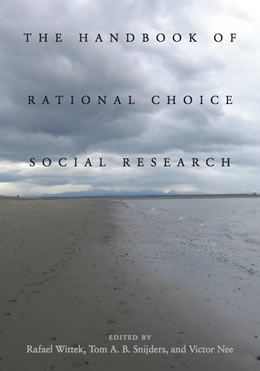Wittek, R., T.A.B. Snijders, V. Nee (2013). The Handbook of Rational Choice Social Research. Palo Alto: Stanford University Press.
The Handbook of Rational Choice Social Research offers the first comprehensive overview of how the rational choice paradigm can inform empirical research within the social sciences. This landmark collection highlights successful empirical applications across a broad array of disciplines, including sociology, political science, economics, history, and psychology. Taking on issues ranging from financial markets and terrorism to immigration, race relations, and emotions, and a huge variety of other phenomena, rational choice proves a useful tool for theory- driven social research. Each chapter uses a rational choice framework to elaborate on testable hypotheses and then apply this to empirical research, including experimental research, survey studies, ethnographies, and historical investigations. Useful to students and scholars across the social sciences, this handbook will reinvigorate discussions about the utility and versatility of the rational choice approach, its key assumptions, and tools.
ISBN: 9780804784184
Best Book Award 2014, American Sociological Association (Rationality and Society Section)
Winner of the Outstanding Academic Title Award, sponsored by Choice
Table of Contents
Part I: Rationality and Decision-making
Chapter 1: Rationality, Social Preferences, and Strategic Decision-making from a Behavioral Economics Perspective
Simon Gächter
Chapter 2: Social Rationality, Self-Regulation, and Well-Being: The Regulatory Significance of Needs, Goals, and the Self
Siegwart Lindenberg
Chapter 3: Rational Choice Research on Social Dilemmas: Embeddedness Effects onTrust
Vincent Buskens and Werner Raub
Chapter 4: Modeling Collective Decision-making
Frans N. Stokman, Jelle Van der Knoop, and Reinier C. H. Van Oosten
Part II: Networks and Inequality
Chapter 5: Social Exchange, Power, and Inequality in Networks
Karen S. Cook and Coye Cheshire
Chapter 6: Social Capital
Henk Flap and Beate Völker
Chapter 7: Network Dynamics
Tom A. B. Snijders
Part III: Communities and Cohesion
Chapter 8: Rational Choice Research in Criminology: A Multi-Level Framework
Ross L. Matsueda
Chapter 9: Secularization:Theoretical Controversies Generating Empirical Research
Nan Dirk De Graaf
Chapter 10: Assimilation as Rational Action in Contexts Defined by Institutions and Boundaries
Victor Nee and Richard Alba
Part IV: States and Conflicts
Chapter 11: Terrorism and the State
Ignacio Sánchez-Cuenca
Chapter 12: Choosing War: State Decisions to Initiate and End Wars and Observe the Peace Afterward
James D. Morrow
Chapter 13: Rational Choice Approaches to State-Making
Edgar Kiser and Erin Powers
Part V: Markets and Organizations
Chapter 14: Market Design and Market Failure
Carlos Cañón, Guido Friebel, and Paul Seabright
Chapter 15: Organizational Governance
Nicolai J. Foss and Peter G. Klein
Chapter 16: Rational Choice and Organizational Change
Rafael Wittek and Arjen Van Witteloostuijn

